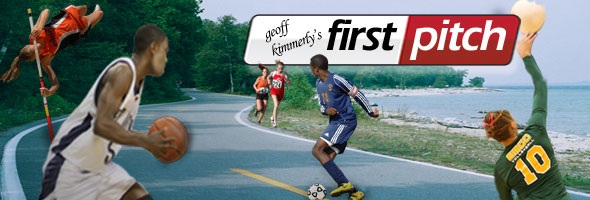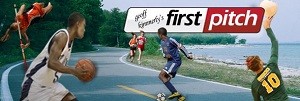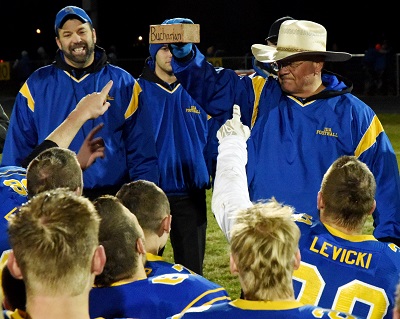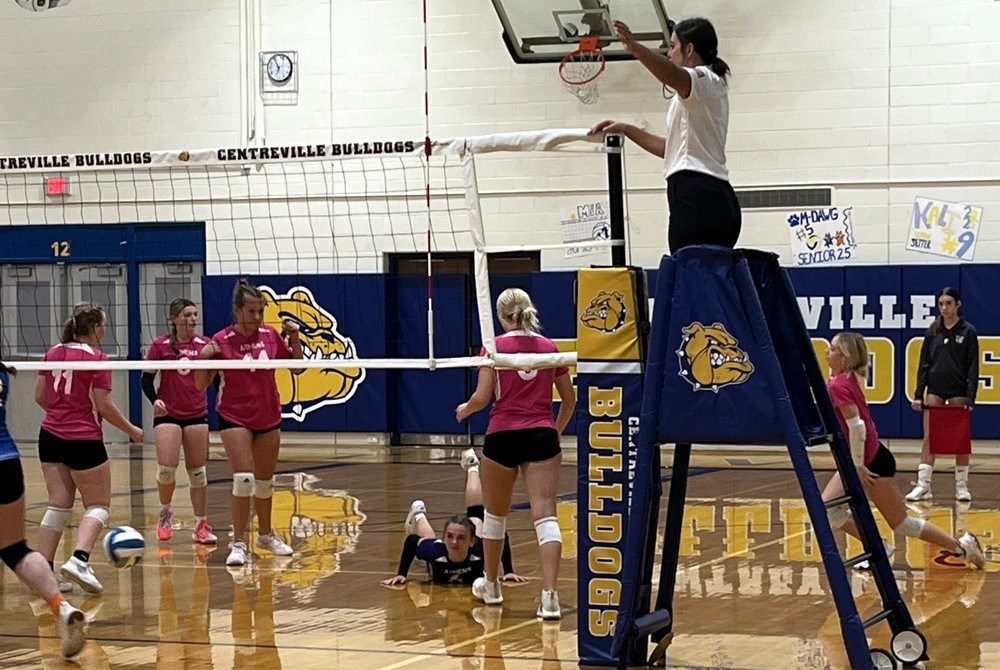
Jackson Area Efforts Net New Officials
February 16, 2016
By Geoff Kimmerly
Second Half editor
Recruitment of new high school officials to eventually take the reins from those currently conducting MHSAA events is a challenge faced all over Michigan.
 The Jackson Area Officials Association is working to restock its ranks by recruiting directly from local schools and developing them with help from veteran mentors.
The Jackson Area Officials Association is working to restock its ranks by recruiting directly from local schools and developing them with help from veteran mentors.
Eight new officials – ages 15 to 24 – who worked a series of youth and middle school games together earlier this month, are among those who have been introduced through a program that begins with a meeting at the end of the high school basketball season between JAOA official Bill Walker and local athletic directors, coaches, fellow officials and other young adults he’s made contact with over the course of a season. From that meeting, Walker builds a list of potential candidates to become officials and then invites them to the annual JAOA Legacy Camp in June.
The camp includes two days of scrimmages between local teams, plus classroom and mechanics teaching. Similar to the MHSAA Legacy program, new officials are paired with veterans, and clinicians evaluate their work during scrimmage play. Walker then keeps in touch with the new officials during the rest of the summer, plugging them in for local youth tournaments and scrimmages, and uses as many as possible while assigning officials for youth tournaments over the winter.
All eight officials who worked the event this month are part of the JAOA legacy partnering, and some of the group already are working games at the junior varsity level – with one, a 19-year-old, recently completing his first varsity game. They come from a variety of Jackson-area schools – Parma Western, Napoleon, Jackson Christian, Michigan Center, Concord and East Jackson. Walker said the recruiting effort has a 60 percent success rate so far. (This June’s legacy camp will be the third.)
“By next season, all (eight) will be official MHSAA registered officials,” he said, noting most currently are registered. “It’s great to have these schools support this program. We all benefit from added, good officiating.”
Passing it forward
Our Battle of the Fans trip to Charlotte on Friday included a conversation about a Feb. 2 game between the Orioles and Mason, which has a pair of athletes fighting cancer. The Charlotte student section dressed in blue that night in support of junior Storm Miller, and during halftime passed buckets to raise money for Miller’s GoFundMe account set up to help pay for his care.
Mason, in turn, provided support Friday to an Owosso alum, 2012 graduate Cody Greger, who remains hospitalized at University of Michigan’s hospital with injuries sustained during a house fire in November. Fans and students collected donations to assist Greger’s family with his care.
“This event was yet another example of the values that school sports teach young people,” Owosso athletic director Dallas Lintner wrote on the school’s website. “And it stands as a testament of the integrity of the young adults that represent our schools and the (Capital Area Activities Conference.)."
100 years of hoops
A decade before the formation of the Michigan High School Athletic Association, Eastern Michigan University – then known as Michigan State Normal College – hosted what is believed to be the first organized high school basketball tournament in state history.
EMU will celebrate this anniversary Saturday in conjunction with the Eagles men’s basketball game against Toledo. Game time is noon at EMU’s Convocation Center, and during a break in play the athletic department will recognize the 12 schools that took part in that 1916 tournament – Marine City, Dundee, Milan, Mancelona, Farmington, Elkton, Royal Oak, Middleville, Lansing, Mount Clemens, Wayne and Saline.
More history, courtesy of EMU:
The game of basketball was developed by James Naismith in 1891 at Springfield College in Massachusetts. As a means of promoting the game throughout the country, physical education professor and EMU's first athletic director Wilber Bowen asked his good friend Naismith to bring the game to the Michigan State Normal College (now known as Eastern Michigan University).
The first basketball game west of the Allegheny Mountains was played at Michigan Normal in 1894 to recognize the new physical education program and to dedicate the new gymnasium on campus.
Then in 1916, Bowen, along with instructors Elmer Mitchell and Lloyd Olds (who was also credited with the introduction of the striped referee jersey), organized the first high school basketball tournament in Michigan. A total of 300 invitations were sent out to all Class B schools in the state. Twelve schools responded, and the first high school boys tournament was held on the Ypsilanti-based campus on March 23-25, 1916.
Entrance to the tournament was free and (the event was) played at the Michigan State Normal School Gymnasium. However, expenses related to transportation, room, and board had to be provided by the participating schools. The MSNC's Physical Education Department made it easier for schools to participate by making arrangements with local residents to provide food at 20 to 25 cents a meal and lodging at 25 cents a night for each player.
That first tournament saw Marine City defeat Dundee in the championship game, 23-22.
The winning team was awarded a silver shield mounted on an oak base. Second prize was a silver cup, and the third place team received a banner. Individual participation awards to all players were also provided. The Ypsilanti Press at the time felt the Normal School "went first class with the awards."
For tickets to Saturday’s game and event, which will be followed by the EMU women’s team taking on Northern Illinois, call the EMU Ticket Office at (734) 487-2282 or visit EMUEagles.com/tickets.
Following up
 • Second Half’s Chip Mundy this fall wrote a story on the emergence of Ida’s football team on the way to making the Division 5 Semifinals and finishing its best season ever. A theme of that story was Ida’s philosophy of building “brick by brick,” coined by defensive line coach Gary Deland, who himself was building back after emergency triple-bypass heart surgery.
• Second Half’s Chip Mundy this fall wrote a story on the emergence of Ida’s football team on the way to making the Division 5 Semifinals and finishing its best season ever. A theme of that story was Ida’s philosophy of building “brick by brick,” coined by defensive line coach Gary Deland, who himself was building back after emergency triple-bypass heart surgery.
“From that very first practice in the summer to the last game as a senior, everything is built brick by brick,” Deland said for that story. “I can draw a correlation between that and my recovery, what I’ve gone through. It’s the same thing. It’s brick by brick.”
Kim Farver sent along this photo of Deland holding up a brick after the team’s 43-20 Regional Final win over Buchanan.
• We released the last batch of this year’s MHSAA-Farm Bureau Insurance Scholar-Athlete Award winners today, and one of the highlights during the 27 years of the contest came two years ago when we caught up with some of our winners from the first 25 years – including Bloomfield Hills Cranbrook-Kingswood’s Abby Cohen, who has gone on to co-found a company and help develop a smartphone application, Wing, to help asthma patients monitor their lung function.
Here’s a look at a video describing the technology she’s helped create:

Southwest 10 Conference Welcoming Volleyball Athletes as Legacy Officials
By
Steve Vedder
Special for MHSAA.com
November 13, 2024
Instead of just hitting a volleyball, Gracie Smith now finds herself enjoying the larger picture.
The Decatur senior has spent the last six years playing volleyball at different levels. But thanks to an innovative new program undertaken by the Southwest 10 Conference, Smith now sees the sport through an entirely new light.
She's one of 13 varsity volleyball players at three schools who've added another paragraph to their resume: officiating.
The players have become MHSAA-registered officials cleared to work Southwest 10 Conference middle school and freshman matches as part of the MHSAA Legacy Program. Smith said the program has contributed much to her love of the game by helping her better understand the officials during her own varsity matches and providing her opportunities to give back to the community and help out a sport in dire need of new officials – in addition to adding a bit of spending money to her budget.
"I am excited about trying this," Smith said. "I can make some extra cash, be at the same level of officials who do our games and take what I've learned on the court and put that knowledge to use.
"I definitely think I'll do this again next year. I can earn a few extra bucks, and I can give something back to the game"
Eric Frohriep, president of the All-Star Officials Association and assigner of officials to Southwest 10 matches, said the project was borne out of a necessity to attract new officials to the sport.
He sent inquires to conference schools looking for high school-aged players willing to undergo officials training that included viewing a video and power point zoom presentation on YouTube. Twenty-three players wound up attending a clinic this past summer, and 13 from Centreville, Decatur and White Pigeon took the next step by registering as officials. They were eligible to work mostly middle school games this fall.
Frohriep hopes the numbers will grow but is more than content with the program's initial steps. He said volleyball is in critical need of attracting new officials to replace those retiring or moving on. He estimates the average age of volleyball officials to be about 60, and the existing cadre of officials is being spread too thin, including a dwindling number of Southwest 10 Conference officials willing to work several nights a week plus weekend tournaments.
"We absolutely have to," he said of attracting new officials. "For those who retire, we're not replacing them fast enough. We've got to lure new officials to maintain the amount of officials we need."
If the new recruits' reactions are any indication, the program is off to a solid start. Decatur senior setter Sienna Potter said it beats other teenage money-making endeavors from babysitting to working at the mall, plus keeps athletes around a sport they love.
"It was fun," said Potter, who worked a handful of both middle school and freshman matches this fall. "I definitely think officiating can be in my future. There's a big need for referees, and I think this was a good idea. I like the money, but I think it also builds my skill in talking to officials at our games. I liked it a lot. It's something interesting, and the money helps out."
Decatur senior Abby Baushke, who has played volleyball competitively for eight years, worked four middle school matches this fall. The experience left her with a more insightful view of the officials she sees at her own varsity matches.
"Plus it helps me give back to the community and helps players understand the sport better," said Baushke, a Wayne State volleyball commit. "I think (officiating) is easier for us because we've played the game. I've learned that it's hard to make quick calls because the game goes so fast. I've played club for four years, and this definitely can be useful to me besides making money."
White Pigeon athletic director Brooke McClure, a former volleyball official, said the program was successful enough that the Southwest 10 elected to start similar programs in basketball and wrestling this winter. Baseball, track, softball and soccer will follow in the spring.
"It's definitely win-win," she said. "There is a shortage of referees and I think, No. 1, these girls are thinking about the game they love and can see the value in that. They're going to learn what it's like to spend a day in officials' shoes. If we can get more girls involved, then this is our contribution to that."
White Pigeon junior Mercede McDaniel, who has played the sport since fourth grade, admits there was a bit of trepidation as she eased into the program, but that was quickly replaced with the confidence of being a registered official.
"It's a nice way to see volleyball," she said. "I was a little nervous at first in trying this, but I love the game. I definitely liked it."
PHOTO Centreville’s Mary Stears stands adjacent and above the net as she officiates a match this fall. (Photo courtesy of the Centreville athletic department.)

